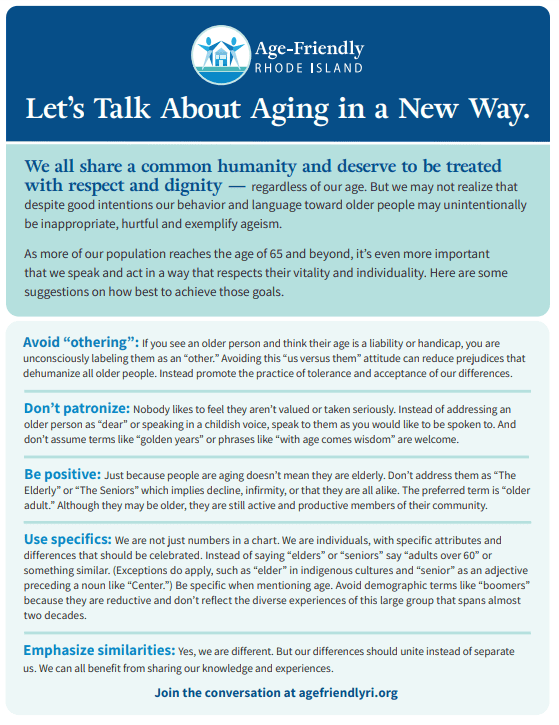October 9th is Ageism Awareness Day – It’s Time to Be Intentional with Our Language
On Ageism Awareness Day, we come together to confront one of the most pervasive yet overlooked forms of discrimination: ageism. As our population grows older, it’s more important than ever to recognize the harmful stereotypes, attitudes, and language that undermine the dignity and contributions of older adults. Ageism Awareness Day serves as a reminder that we must challenge these biases and embrace a more respectful, inclusive view of aging.
One of the key areas where ageism manifests is in the language we use when talking about older adults. Even well-meaning words and phrases can reinforce harmful stereotypes, unintentionally reducing older people to outdated or patronizing tropes. To build a more age-inclusive culture, it’s essential to adopt language that respects the individuality and humanity of older adults. Here are some important guidelines to avoid ageist language, based on best practices in inclusive communication:
1. Avoid “Othering” Older Adults
“Othering” occurs when we unconsciously view older people as fundamentally different or separate from younger generations. This “us versus them” mentality dehumanizes older adults and fuels prejudice. Instead, we should emphasize shared humanity and promote tolerance of our differences. Recognizing older adults as fully integrated members of society helps combat the stereotypes that can lead to exclusion and discrimination.
2. Use Specific and Respectful Terminology
Instead of using blanket terms like “seniors” or “elders,” which can feel reductive, aim to be specific. Referring to people as “adults over 60” or “older adults” respects their individuality and avoids lumping them into a single homogenous group. It’s also important to avoid demographic labels like “boomers,” which oversimplify the experiences of a generation that spans nearly two decades(Older Talking rev 2024-…). Respectful language highlights the distinct contributions and experiences of each person, rather than reducing them to their age group.
3. Emphasize the Positives
Aging does not mean decline. The terms “elderly” or “the seniors” can perpetuate negative stereotypes that equate aging with frailty or infirmity. It’s important to use language that reflects the continued vitality and productivity of older adults. The term “older adult” is preferred because it acknowledges that while they may be aging, they remain active members of their communities(Older Talking rev 2024-…). Avoiding language that implies decline helps challenge the misconception that older adults are less capable or engaged.
4. Don’t Patronize
Many older adults report feeling patronized by the way people speak to them. Terms like “dear” or speaking in a condescending tone can make older adults feel infantilized. It’s crucial to speak to older adults as equals and avoid phrases that imply they are less capable or in need of pity, such as “golden years” or “with age comes wisdom.” Instead, engage with older adults as you would with anyone else, respecting their intelligence, autonomy, and dignity.
5. Highlight Similarities, Not Differences
While acknowledging the unique experiences of aging, it’s also important to recognize the commonalities we share across generations. Highlighting our shared experiences can bring people together, creating a sense of community rather than division. By fostering intergenerational conversations, we can break down age-based stereotypes and build a more inclusive society.
Ageism Awareness Day reminds us to rethink how we talk about and engage with older adults. By eliminating ageist language and embracing more inclusive communication, we can help ensure that older adults are respected, valued, and included in all aspects of life. Language matters—it shapes our perceptions and influences how we treat others. By adopting these changes, we can contribute to a society that views aging as a natural, valuable part of life, and recognizes the unique contributions of all individuals, regardless of age. Let’s use this day as a starting point to talk about aging in a new way, one that is grounded in respect, dignity, and inclusion for everyone. Download our guide, “Let’s Talk About Aging in a New Way,” to learn how to avoid ageist language and promote respect for older adults in everyday conversations.

